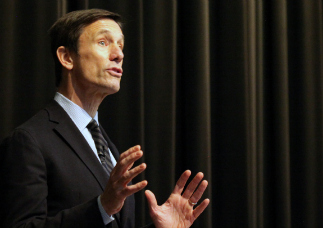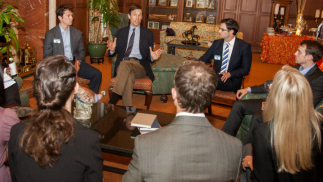News & Stories
Fight less, collaborate more
 Solving major environmental challenges requires more collaboration – and a lot less fighting.
Solving major environmental challenges requires more collaboration – and a lot less fighting.
Too much fighting is the biggest obstacle to solving big environmental challenges, said Mark Tercek, president and CEO of The Nature Conservancy, one of the world’s leading conservation organizations.
Environmentalists are passionate, but that “passion can get in the way of calm reasoning,” Tercek said during his Dean’s Speaker Series talk, part of UNC Kenan-Flagler’s yearlong celebration of its 15-year anniversary as a global leader in sustainable enterprise.
“We start to lecture and criticize and vilify people with other views,” said Tercek. The resulting damage to relationships slows the path to finding pragmatic solutions to disputes between interest groups.
“Fighting is overrated and cooperation, on the other hand, is underrated,” he said.
Tercek pointed to the successful collaboration around the goal of eliminating ozone-depleting chlorofluorocarbon (CFC). Despite hesitation and opposition from businesses, consumers and countries around the world, the U.S. government and scientists worked together to tax and ban CFCs around the world, he said. The result was a 90 percent reduction in ozone depletion.
“It’s a story of good science,” he said. “It’s a good story of rapid technological advancement and it’s a story of successful cooperation.”
 Tercek joined The Nature Conservancy– which he described as a non-partisan, pragmatic “big NGO” – in 2008 after spending 24 years at Goldman Sachs, where he was a managing director and partner.
Tercek joined The Nature Conservancy– which he described as a non-partisan, pragmatic “big NGO” – in 2008 after spending 24 years at Goldman Sachs, where he was a managing director and partner.
That business background helps him engage companies in The Nature Conservancy’s work to solve environmental problems. The organization worked with Cargill to combat deforestation and protect biodiversity in Brazil’s Amazon Rainforest, and with Ecuadorian partners to improve water quality and supplies in the capital city of Quito. In both cases, they found sustainable solutions that yielded future economic returns and positive environmental impacts.
“I think business people – and business students especially – are naturally attracted to bringing people together in a pragmatic, results-driven way,” Tercek said.
The Nature Conservancy’s partnership with corporations is not always popular with environmentalists but can accelerate the impact of their work. If a process or tactic is environmentally sound and good for the bottom line, a firm will adopt it – and others will follow, he said.
Tercek made a call for smart, pragmatic and courageous leaders – and challenged everyone to incorporate collaboration into their life.
“Deemphasizing fighting to find common ground is not just a pragmatic way to solve environmental problems,” he said. “It’s a joyous way to live life.”